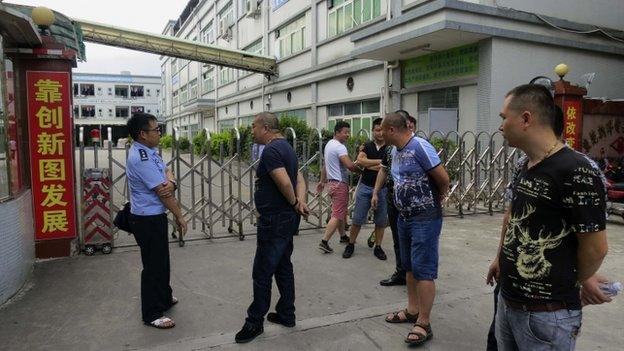Apple 'deeply offended' by BBC investigation
- Published
Richard Bilton reports from Shanghai: ''An exhausted workforce''
Apple has said it is "deeply offended" by a BBC investigation into conditions for workers involved in manufacturing its devices.
Rules on workers' hours, ID cards, dormitories, work meetings and juvenile workers were routinely breached, the Panorama programme witnessed.
In a staff email, senior Apple executive Jeff Williams said he knew of no other company doing as much as Apple to improve conditions.
But he added: "We can still do better."
Panorama's editor Ceri Thomas said he stood by the programme's journalism.
He said the team had found an exhausted workforce making Apple products in China, as well as children working in extremely dangerous tin mines in Bangka, Indonesia.
"While Apple did confirm earlier this year that it gets tin from Bangka, it had never been confirmed whether illegal tin was entering their supply chain," he said.
"We got the first evidence of this on our trip.
"We told Apple what we had found almost two months ago. Although Apple was happy to give us a non-attributable briefing, we were disappointed that the company wasn't prepared to explain its position on camera."
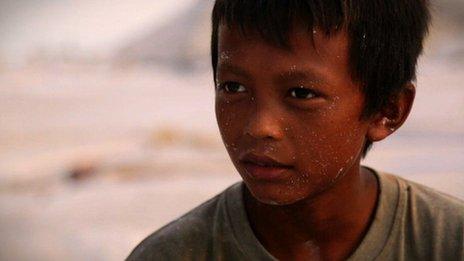
Panorama found little to stop the tin mined by children ending up in Apple's products
Mr Williams' email, published in full by The Telegraph, external (and reproduced below), was sent to around 5,000 Apple staff in the UK.
"Panorama's report implied that Apple isn't improving working conditions," he wrote.
"Let me tell you, nothing could be further from the truth."
He said he wanted the email to offer "facts and perspective, all of which we shared with the BBC in advance, but were clearly missing from their programme".
He wrote that he and Apple chief executive Tim Cook were "deeply offended by the suggestion that Apple would break a promise to the workers in our supply chain or mislead our customers in any way".
He added: "We are honest about the challenges we face and we work hard to make sure that people who make our products are treated with the dignity and respect they deserve."
Apple had declined to be interviewed for the programme.
'Appalled'
The email goes on to outline some of the efforts Apple has made to improve working conditions in its various factories across China.
The Panorama film showed exhausted workers falling asleep on their 12-hour shifts at Pegatron factories on the outskirts of Shanghai.
One undercover reporter, working in a factory making parts for Apple computers, had to work 18 days in a row despite repeated requests for a day off.
Mr Williams said Apple had undertaken an audit of working hours.
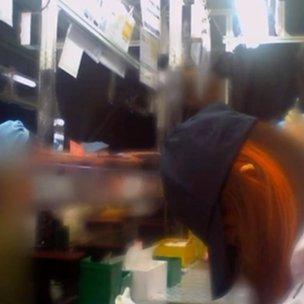
Secret filming showed exhausted workers falling asleep while at their stations
"Several years ago, the vast majority of workers in our supply chain worked in excess of 60 hours, and 70+ hour work-weeks were typical.
"After years of slow progress and industry excuses, Apple decided to attack the problem by tracking the weekly hours of over one million workers, driving corrective actions with our suppliers and publishing the results on our website monthly - something no other company had ever done.
"This year, our suppliers have achieved an average of 93% compliance with our 60-hour limit."
It also explained how the firm supports moves to address the issue of illegal mining in countries such as Indonesia.
In the Panorama programme, children were seen mining for the tin typically used in devices such as smartphones and tablets.
The process can be extremely dangerous - miners can be buried alive when the walls of sand or mud collapse.
The programme spoke to 12-year-old Rianto who was working with his father at the bottom of a 70ft cliff of sand.
He said: "I worry about landslides. The earth slipping from up there to the bottom. It could happen."
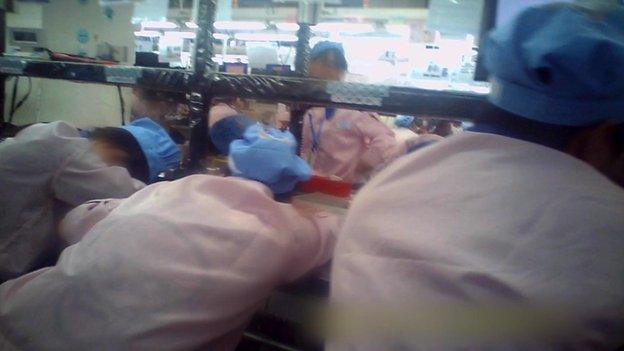
Pegatron has said it will look carefully at the BBC's claims
In the Apple staff email, Mr Williams said: "Our team visited the same parts of Indonesia visited by the BBC, and of course we are appalled by what's going on there.
"We spearheaded the creation of an Indonesian Tin Working Group with other technology companies.
"Apple is pushing to find and implement a system that holds smelters accountable so we can influence artisanal mining in Indonesia."
He concluded: "We know there are a lot of issues out there, and our work is never done.
"We will not rest until every person in our supply chain is treated with the respect and dignity they deserve."
Watch Panorama: Apple's Broken Promises on BBC iPlayer.

In full: Email to staff from Apple senior vice president of operations Jeff Williams
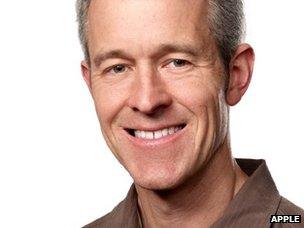
Jeff Williams sent an email to around 5,000 UK staff
UK Team,
As you know, Apple is dedicated to the advancement of human rights and equality around the world. We are honest about the challenges we face and we work hard to make sure that people who make our products are treated with the dignity and respect they deserve.
Last night, the BBC's Panorama program called those values into question. Like many of you, Tim and I were deeply offended by the suggestion that Apple would break a promise to the workers in our supply chain or mislead our customers in any way.
I'd like to give you facts and perspective, all of which we shared with the BBC in advance, but were clearly missing from their program.
Panorama showed some of the shocking conditions around tin mining in Indonesia. Apple has publicly stated that tin from Indonesia ends up in our products, and some of that tin likely comes from illegal mines. Here are the facts:
Tens of thousands of artisanal miners are selling tin through many middlemen to the smelters who supply to component suppliers who sell to the world. The government is not addressing the issue, and there is widespread corruption in the undeveloped supply chain. Our team visited the same parts of Indonesia visited by the BBC, and of course we are appalled by what's going on there.
Apple has two choices: We could make sure all of our suppliers buy tin from smelters outside of Indonesia, which would probably be the easiest thing for us to do and would certainly shield us from criticism. But it would be the lazy and cowardly path, because it would do nothing to improve the situation for Indonesian workers or the environment since Apple consumes a tiny fraction of the tin mined there. We chose the second path, which is to stay engaged and try to drive a collective solution.
We spearheaded the creation of an Indonesian Tin Working Group with other technology companies. Apple is pushing to find and implement a system that holds smelters accountable so we can influence artisanal mining in Indonesia. It could be an approach such as "bagging and tagging" legally mined material, which has been successful over time in the Democratic Republic of the Congo. We are looking to drive similar results in Indonesia, which is the right thing to do.
Panorama also made claims about our commitment to working conditions in our factories. We know of no other company doing as much as Apple does to ensure fair and safe working conditions, to discover and investigate problems, to fix and follow through when issues arise, and to provide transparency into the operations of our suppliers.
I want you to know that more than 1400 of your Apple coworkers are stationed in China to manage our manufacturing operations. They are in the factories constantly — talented engineers and managers who are also compassionate people, trained to speak up when they see safety risks or mistreatment. We also have a team of experts dedicated solely to driving compliance with our Supplier Code of Conduct across our vast supply chain.
In 2014 alone, our Supplier Responsibility team completed 630 comprehensive, in-person audits deep into our supply chain. These audits include face-to-face interviews with workers, away from their managers, in their native language. Sometimes critics point to the discovery of problems as evidence that the process isn't working. The reality is that we find violations in every audit we have ever performed, no matter how sophisticated the company we're auditing. We find problems, we drive improvement, and then we raise the bar.
Panorama's report implied that Apple isn't improving working conditions. Let me tell you, nothing could be further from the truth. Here are just a few examples:
Several years ago, the vast majority of workers in our supply chain worked in excess of 60 hours, and 70+ hour workweeks were typical. After years of slow progress and industry excuses, Apple decided to attack the problem by tracking the weekly hours of over one million workers, driving corrective actions with our suppliers and publishing the results on our website monthly — something no other company had ever done. It takes substantial effort, and we have to weed out false reporting, but it's working. This year, our suppliers have achieved an average of 93% compliance with our 60-hour limit. We can still do better. And we will.
Our auditors were the first to identify and crack down on a ring of unscrupulous labor brokers who were holding workers' passports and forcing them to pay exorbitant fees. To date, we have helped workers recoup $20 million in excessive payments like these.
We've gone far beyond auditing and corrective actions by creating educational programs for workers in the same facilities where they make our products. More than 750,000 people have taken advantage of these college-level courses and enrichment programs, and the feedback we get from students is inspiring.
I will not dive into every issue raised by Panorama in this note, but you can rest assured that we take all allegations seriously, and we investigate every claim. We know there are a lot of issues out there, and our work is never done. We will not rest until every person in our supply chain is treated with the respect and dignity they deserve.
If you'd like to learn more about our Supplier Responsibility program, I encourage you and our customers to visit our website at apple.com/supplierresponsibility.
Thanks for your time and your support.
Jeff
- Published18 December 2014
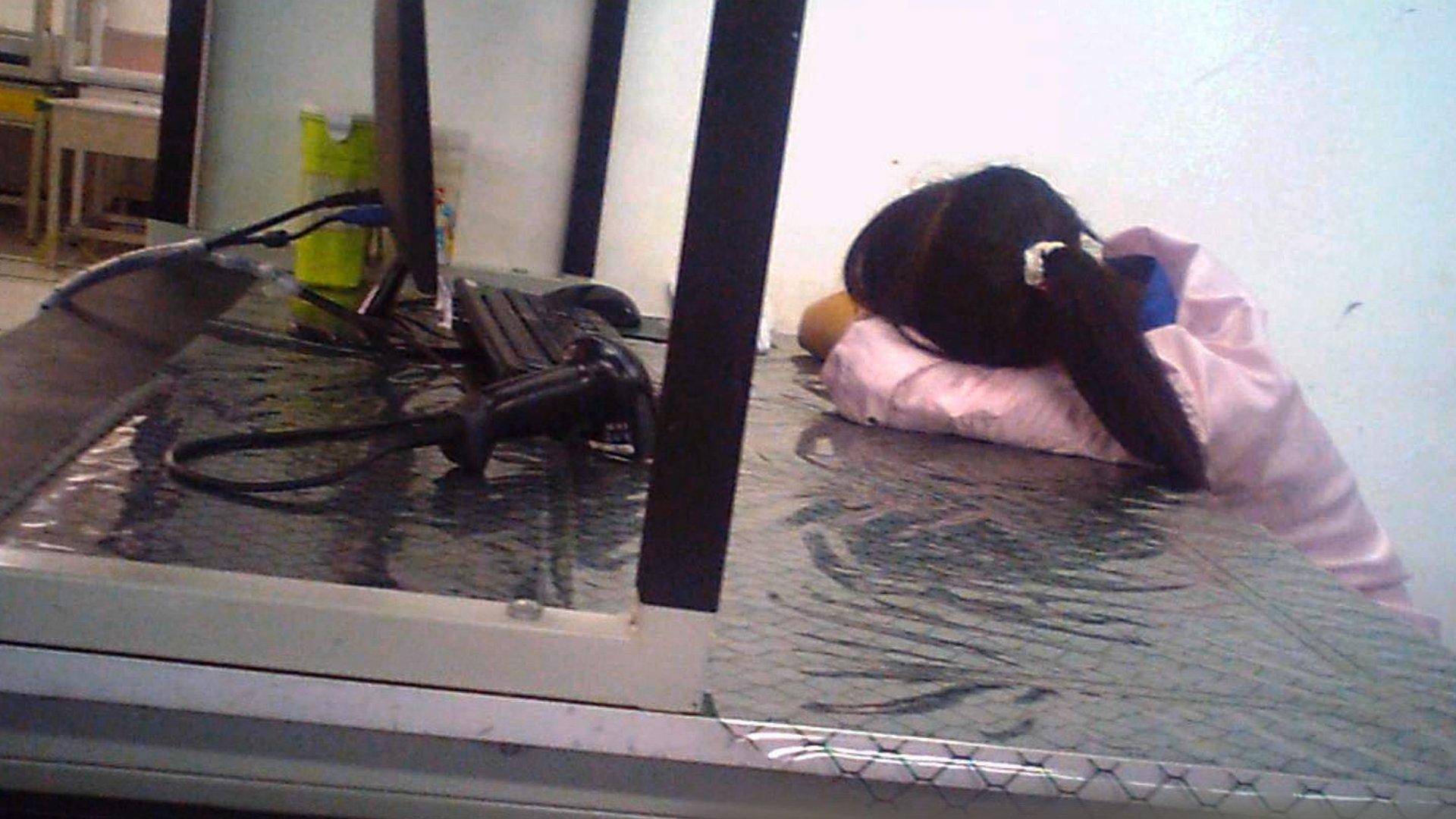
- Published8 March 2012
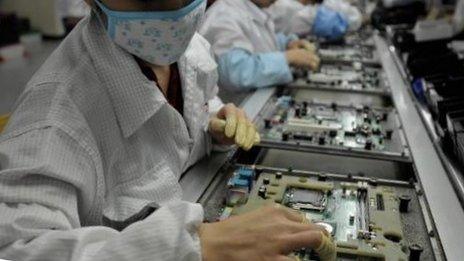
- Published2 June 2010
- Published30 June 2014
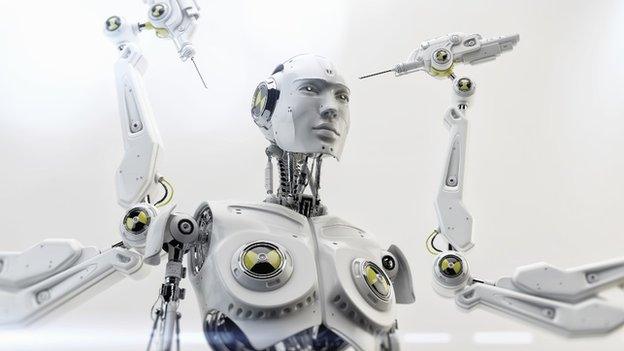
- Published5 August 2014
